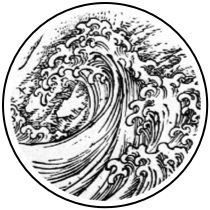
Seishindo
The Way of The Mountain Stream
The Tao is the breath that never dies. It is a Mother to All Creation. It is the root and ground of every soul – the fountain of Heaven and Earth, laid open. Endless source, endless river, river of no shape, river of no water, drifting invisibly from place to place . . . it never ends and it never fails. The sage’s way, Tao is the way of water.1
Sei Shin Do
![]() The ideogram for the word “Seishin” conveys the image of pure, clear water running down a mountain. Seishindo Aikido implies that in our practice of Aikido we follow the principle and movement of the mountain stream, the way of water.
The ideogram for the word “Seishin” conveys the image of pure, clear water running down a mountain. Seishindo Aikido implies that in our practice of Aikido we follow the principle and movement of the mountain stream, the way of water.
It is the nature of water that it will assume the shape of whatever form it encounters while remaining forever formless in itself. Water is the epitome of non-resistance. In its coursing flow it will bend and adapt to whatever it encounters. Thus by following the natural order, water overcomes that which would oppose its natural flow.
The sage needs to know like water how to flow around the blocks and how to find the way through without violence. Like water, the sage should wait for the moment to ripen and be right: water, you know, never fights, it flows around without harm.2
Because water illustrates the principle of Li (organic or natural order, the asymmetrical, nonrepetitive, and unregimented order which we find in the patterns of moving water, the forms of trees and clouds, of frost crystals on the window, or the scattering of pebbles on the beach sand)3 we have in water the perfect metaphor from which to develop the movement of our art.
The principle of harmony in Aikido demands that the art’s execution not be restricted by fixed forms or regimented reaction. Its nature is to adapt to and blend with the nature of its encounter. It comes to the encounter open and free to take on whatever form is demanded of it, non-physical or physical. This is the nature of the Aikido we choose to practice.
W. Muryasz
_______________________
1 Man - Ho Kwok, The Illustrated Tao Te Ching, p.14
2 Ibid, p. 41
3 Alan Watts, Tao The Watercourse Way, p. 47